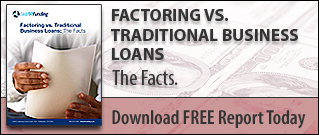Factoring Loans Aren’t Really Loans, But They’re A Great Way to Fund Your Business
Factoring facilities are often referred to as factoring loans. It’s not necessarily a problem to group it in the same category as other business loans, but factoring an invoice technically isn’t a loan. Merriam-Webster defines a loan as “money lent at interest.”
With factoring, you aren’t borrowing money and “interest” is not being charged. With factoring, you are selling an invoice to a finance company at a small discount. You get cash as soon as you invoice and the factoring company takes on the burden of collecting the invoice.
Why Does This Distinction Matter?
Maybe it’s because I’m a finance person that I tend to be overly-technical in my terminology, but the term “factoring loans” bothers me. It’s just a term that some use to describe factoring. It doesn’t change how factoring works, but I think the word “loan” carries somewhat of a negative connotation.
A loan is simply a tool that a business can use. It’s no different than the hammer sitting in your garage. The hammer isn’t evil. It doesn’t have any ill intent, but I know some hammers that have caused their fair share of bruised thumbs.
Debt is often referred to as leverage. It magnifies your efforts. It allows you to do more with less capital. This means that growth can happen much more quickly, but it also means that mistakes have a much bigger impact.
How Factoring is Different
When you invoice your customers, there are typically only two parties involved – you and your customer. You send the invoice, the customer pays you. In factoring, a third party enters the picture – the factor.
You still invoice the same, but you submit the invoice to the factoring company. The factor purchases the invoice from you and sends the invoice to your customer. When the invoice is due, your customer pays the factoring company.
It’s not a loan. You’re selling an asset – your invoice – to fund your business.
Factoring Is Funding That Carries Less Risk than a Loan
In the same way that using a hammer carries some risk for your thumb, carrying debt brings some level of additional risk to your business. Since factoring loans aren’t really loans, it carries much less risk than traditional financing.
You still get cash just as you would with a traditional loan; however, you’re not on the hook for principal and interest payments each month. You simply sell an invoice, you get funding and the invoice is paid by your customer.
Factoring Solves a Key Problem Small Businesses Face
Factoring also targets a key issue for small businesses – customers that take too long to pay. Businesses that can get by without offering terms to their customers are few and far between. Invoicing customers on 30 or 60 day terms is normal for most businesses.
You often need to offer terms in order to attract and retain customers; however, if they take too long to pay it puts you in a cash crunch. Factoring acts as a bridge between these two points. You still invoice with 30 or 60 day terms, but you get cash up front. The customer gets the benefit of having a month to pay the invoice, but it doesn’t put you in a bind.
Factoring Provides More than Funding For Your Business
While the primary benefit to factoring is funding for your business, it also has ancillary benefits that you won’t find with traditional financing. Since the factoring company is purchasing your receivables, they have a vested interest in their performance. You get the benefit of the due diligence that they perform on your invoices and your customer base.
In addition to providing funding, factoring let you:
- Know which customers pose the largest credit risk.
- Have an outsourced team to pursue collections when necessary.
- Sleep well knowing that there are funds available to make payroll.
- Take advantage of year-end tax planning, such as buying inventory in bulk.
- Stay on good terms with your vendors and take advantage of early-pay discounts.
Don’t Settle for Traditional Loans
“Factoring loans” are so much more than an analogue to a traditional business loan. They are a way to fund your business with significantly less risk. They also provide several benefits that you would never get when working with a traditional bank. Factoring is a great way to fund your business.












